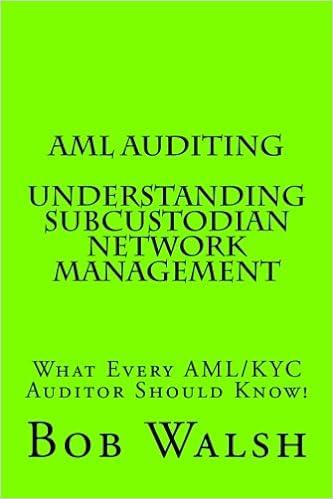
Q. 5.
a.
Calculate the breakeven number of additional customers for each added hour of
operation up to 4am.
b. Calculate the breakeven number of additional customers for an entire year, assuming (i) a closing time of 4am and then (ii) your recommended closing time, if it differs from 4am.
c. Find the safety margin on new customers for the year.
[Hint: For the per-year analysis, remember to account for the cost of the security upgrade. Use straight- line depreciation as a measure of the fixed cost of the security upgrade, and then add the cost of overtime labor for the additional hours of business for each of the 360 business days in the year.]
BEVERAGE CENTER #40 Amber, as you know, the Gould state legislature passed legislation last year allowing alcoholic Center to be sold in retail establishments unti 4.00 a.m We don't have to close our shop by 10 p.m. as required by the previous law. However, I am wondering if it is economical for us to open until 4:00 am. How many additional customers would we get by extending our hours? Would doing so increase our pro ts?would like you to look into this issue for our downtown location and give me your recommendation Mike King, General Manager of BEVERAGE Center, spoke these words to Amber Wright, his Operations Manager. BEVERAGE is a major beverage retailer. It owns several wine and spinit stores that are part of its alcoholic Center division Beverage Center #4 is part of ths chain of stores owned by the parent company- lt is located in the downtown area, and while it has been reasonably profitable in the past, its financial performance has been declining in recent years. A store manager, an assistant manager, and two sales and inventory clerks run the store. The division provides general business and administrative support to each store. These services include purchasing bookkeeping, economic analysis, and legal advice. To respond to King's request, Amber Wright asked her accountant, Jennifer Kelly, to provide her with some data on the revenue and costs for the store. Specifically, she wanted to know the average purchase per customer and the cost of extending the store hours. Jennifer decided to sample a small set of customer invoices to see what they purchased. She selected two random samples of 30 customers each and analyzed what they had bought and the cost of the tems that they had purchased. One sample represented "day customers" (those who purchased before 6:00 p.m.) and the other was for "evening customers' (those who purchased after 6:00 p.m). Attachment 1 provides this data. During the data presentation, Jennifer remarked, "Amber, there are two other things you should know about extending our hours. First, we will have to pay a 50% overtime bonus to our two night salespeople at the store for any hours after midnight Second, we will have to invest in a better security system, I estimate that this will cost us approximately $21,000 in construction and rewining cost. The improvements will have a life of seven years and we depreciate our assets using the straight-ine method. The improvements are expected to have no salvage value. After looking at the data collected by Jennifer. Amber Wright decided to experiment with different closing times for the store. Because Amber felt that the store closing was not simply a choice between two options-10:00 pm, and 4.00 a.m.-she asked the Beverage Center #4 store manager to experiment for two weeks each with different closing times. She wanted to know how many customers came in during each hour of business for each closing time. She did this by progressively extending the closing time beyond 10:00 p.m. until 4:00 a.m. Attachment 2 summarizes the resuts of her experimentation with hours of operation. When all of the data was collected, Amber sent her analysis to Mike. Her analysis is reproduced in Exhibit 1 below. Copyright, Glen Whitman and Shahid Ansari, 2009





 Q. 5. a. Calculate the breakeven number of additional customers for each added hour of operation up to 4am.
Q. 5. a. Calculate the breakeven number of additional customers for each added hour of operation up to 4am. 





